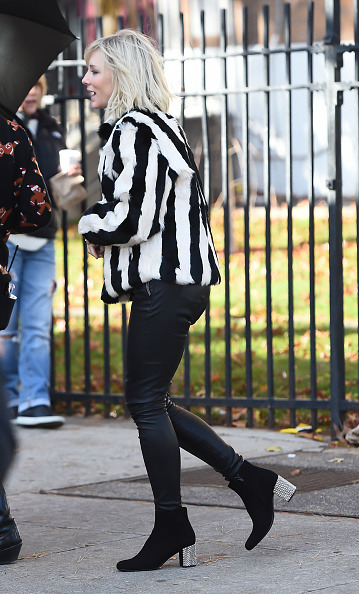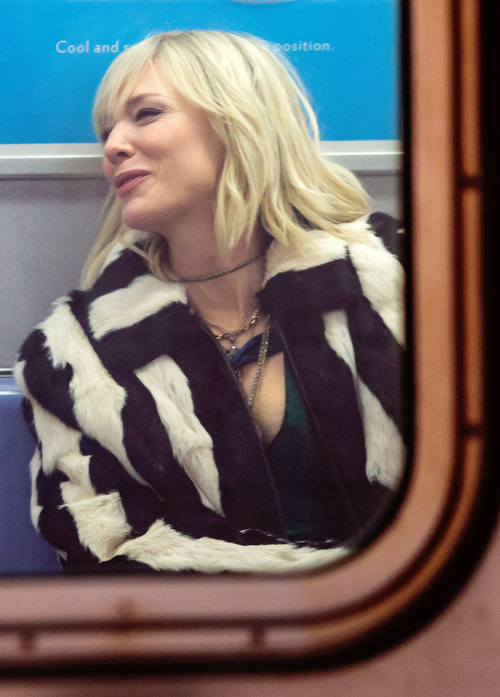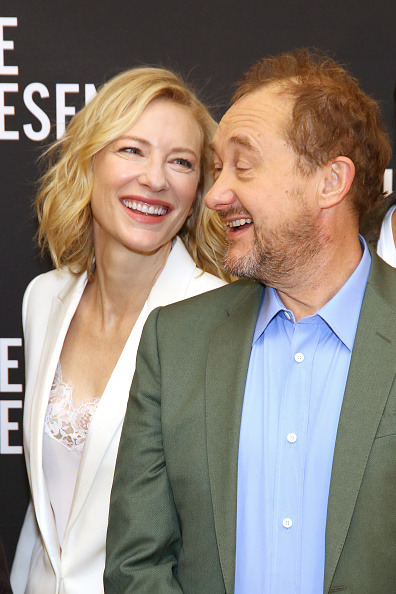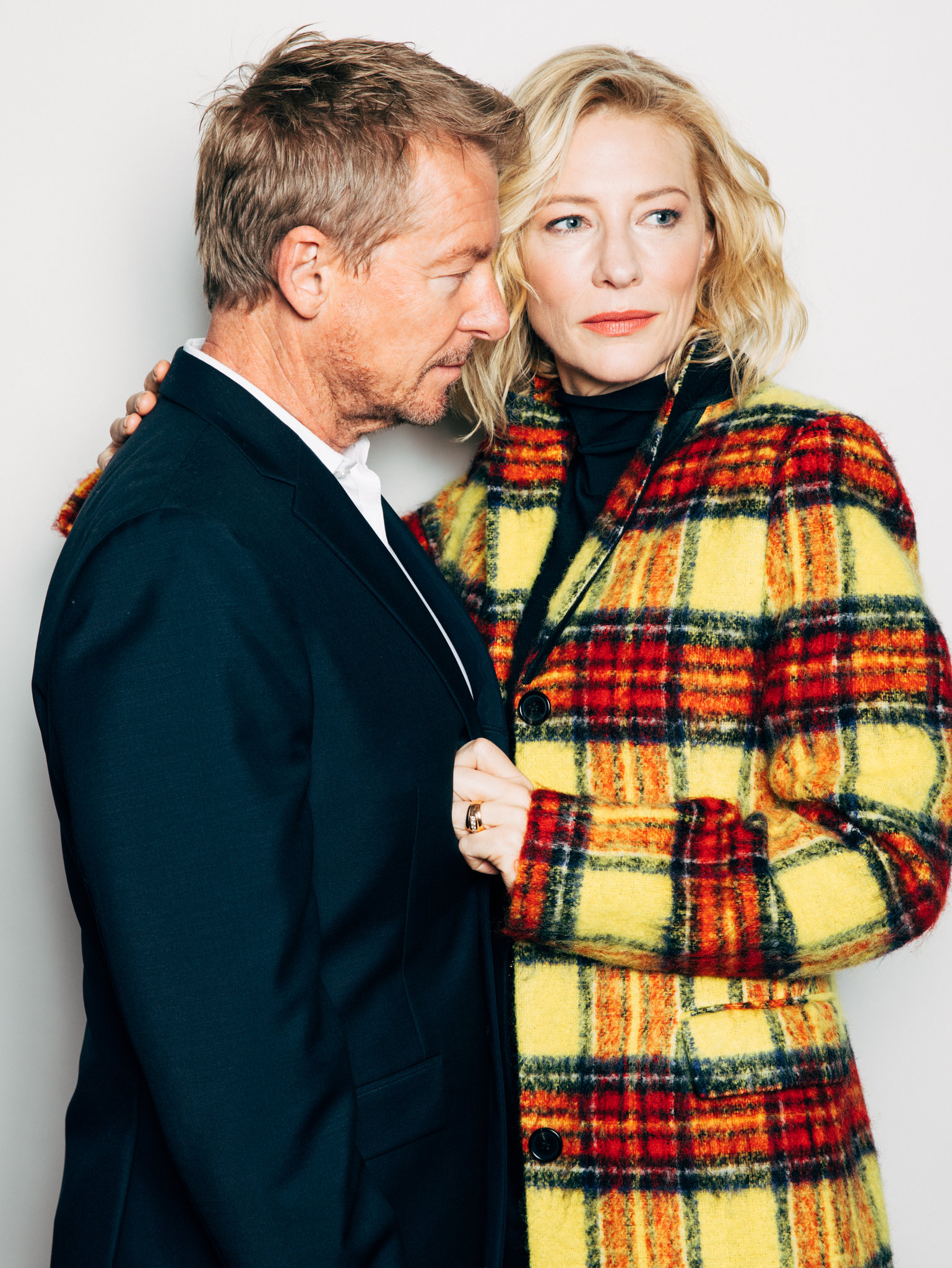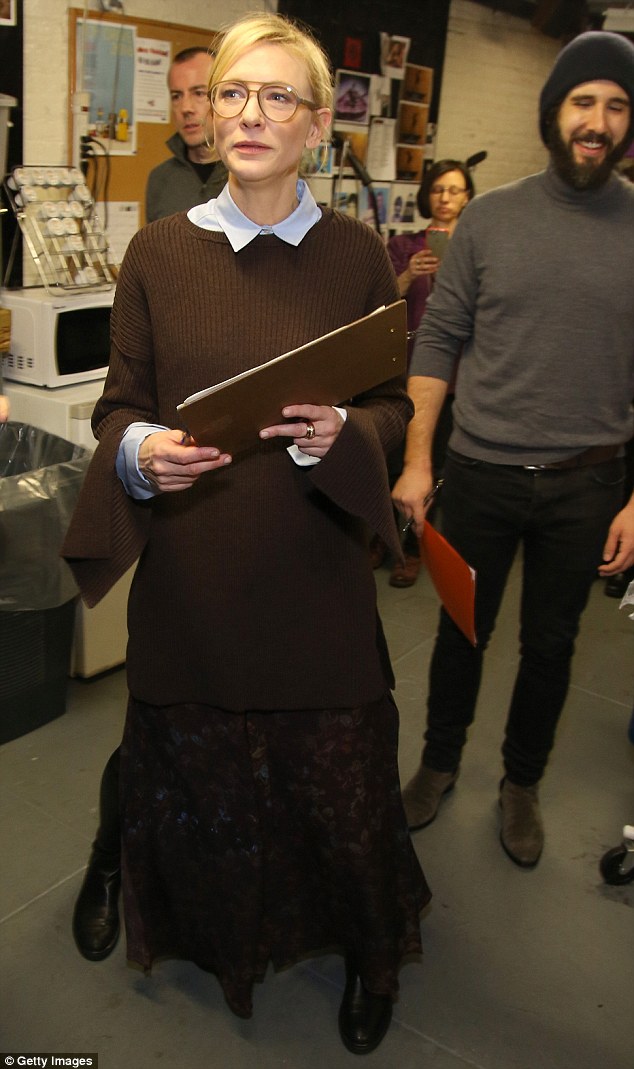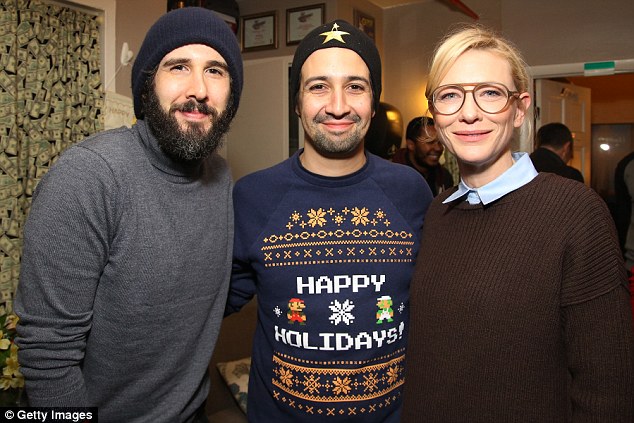You are using an out of date browser. It may not display this or other websites correctly.
You should upgrade or use an alternative browser.
You should upgrade or use an alternative browser.
Cate Blanchett
- Thread starter Prada's Meadow
- Start date
More options
Who Replied?Her skin is glowing and she looks fantastic in that white suit!
Her skin is glowing and she looks fantastic in that white suit!
A great ambassador for SK-II
Absolutely!A great ambassador for SK-II
Cate Blanchett and Richard Roxburgh, in Love and Battle
The Australian actors team up yet again onstage, this time in “The Present.” It can’t possibly end well, can it?
By ALEXIS SOLOSKI
When Cate Blanchett and Richard Roxburgh fall for each other, it rarely ends well. Dynasties crumple. Lives smash. Murder can follow. Or suicide. Sometimes both.
But these Australian actors, who have performed opposite each other for more than 20 years, seemed in rude health at a recent weekday brunch. On a break from rehearsals for “The Present,” an adaptation of an early Anton Chekhov play now in previews at the Barrymore Theater, they nestled in a corner booth at the Russian Samovar and listened to a waiter describe infused vodkas. “You cannot leave this place without trying many,” the waiter demanded.
“We have to do this,” Mr. Roxburgh said.
“We have to try this,” Ms. Blanchett concurred.
“Out of respect for Chekhov,” Mr. Roxburgh said.
Tipsy or sober, they do have a helpless reverence for Chekhov and a shared history with his plays. They played Nina and Trigorin in “The Seagull” in 1997 (dead child, wrecked life). They reunited as Yelena and Vanya for “Uncle Vanya” in 2010 (attempted murder, attempted suicide). Ben Brantley described this three-hour Sydney Theater Company production as “among the happiest of my theatergoing life.”
They’re reuniting for “The Present,” a hectic and sometimes wrenching comedy directed by John Crowley (“Brooklyn,” “The Pillowman”). When it had its premiere in Sydney, The Daily Telegraph called it “blisteringly brilliant.”
Adapted by Andrew Upton, Ms. Blanchett’s husband, it is a bold and boldly comic rendering of Chekhov’s first full-length play, never performed in his lifetime and discovered in a safe deposit box in 1920, 16 years after his death. In its original form, the manuscript is an untitled, fragmented, 300-page muddle of a melodrama, most often called “Platonov.”
Mr. Upton has updated the action to 1990s Russia. “That shift out of communism, through perestroika and glasnost, and into the rise of the oligarchs — it’s such a lost opportunity,” he said by telephone. “For the world, but really for the Russians.”
He has also advanced the characters into middle age, when they’re increasingly conscious of their own lost opportunities.
In times of such political and personal uncertainty, it can help to have old friends around. Certainly, Ms. Blanchett, 47, and Mr. Roxburgh, 54, were pleased to have a chance to love and wound and taunt one another again. More than 20 years of acting opposite each other has given them a kind of radical intimacy, a passion that flashes between the characters, even though, as here, the love affairs portrayed never succeed and often can’t get started at all.
Mr. Roxburgh plays Mikhail Platonov, a former idealist wasting himself on vodka and women, while Ms. Blanchett plays Anna Petrovna, a widow uncertain of her future, who somehow adores him.
“Here we are,” Anna tells Mikhail. “Just like old times, fighting over things we can’t change and probably wouldn’t even if we could.”
Offstage, Ms. Blanchett, and Mr. Roxburgh don’t fight, but they do have cheerful disagreements — about whether beer is drinkable (him: yes; her: no), about whether Mr. Roxburgh is still handsome (him: no; her: yes), about whether Ms. Blanchett should play King Lear (him: yes; her: no). They couldn’t even agree about the dazzlingly yellow shots of sea buckthorn vodka, the weekly special.
“Oh, yeah,” Mr. Roxburgh said approvingly, “that’s a morning vodka.” Ms. Blanchett pronounced it medicinal, then knocked her glass over. “I’m a one-pot screamer,” she said, an Australian idiom for a one-drink drunk.
Everyone drinks a lot more in “The Present,” a play in which the vodka flows like so much seltzer. And with the drink comes a kind of melancholy, a look backward at choices fumbled and prospects botched.
Rehearsing the show has pushed Ms. Blanchett and Mr. Roxburgh into some introspection of their own, thinking through their history with the Sydney Theater Company — he is a longtime collaborator, Ms. Blanchett and her husband are past artistic directors — and the way their acting has evolved. “You become naturally reflective about who you are, what you are, what you were,” Mr. Roxburgh said.
Their shared lives as actors, which includes a wedding scene in the 1997 movie, “Thank God He Met Lizzie,” predates either of their marriages — Ms. Blanchett met Mr. Upton a year after she played Ophelia to Mr. Roxburgh’s Hamlet in 1995. Mr. Roxburgh met his wife, the actress and cookbook author Silvia Colloca, on the set of the 2004 film “Van Helsing.”
She first saw him in a Dennis Potter play. He first saw her in a drama-school performance, playing Shakespeare’s Rosalind “with phenomenal poise and wit,” he said. Ms. Blanchett recalled their work on “Hamlet” fondly until, as she said, “you deliberately dislocated your knee so that you wouldn’t have to work with me anymore.”
“That’s sort of an outlandish version of events,” Mr. Roxburgh said. He still remembers the way she said, “My lord, I have remembrances of yours/That I have longed long to redeliver.”
Those remembrances, under Neil Armfield’s direction, included a monkey finger puppet, but for Mr. Roxburgh, that moment was “was deeply wounding and profound,” he said tenderly. “Every night.”
Are they the same actors they were then? Yes and no. Ms. Blanchett has never settled on any particular approach, though she did note that, “As a parent I’ve become a lot more economical.”
“That’s a great word,” Mr. Roxburgh said. “I don’t tie myself up in such knots anymore about trying to get something that is unattainable or ——”
“Perfect,” Ms. Blanchett said.
Both of them are busy with children and competing projects. Ms. Blanchett has three sons and a toddler daughter. Mr. Roxburgh has two sons and a daughter due in March. He has been occupied with his Australian television series, “Rake,” in which he plays an ethically challenged lawyer whose dissipation rivals Mikhail’s. (In Season 3, Ms. Blanchett had a cheeky cameo as his lesbian alter ego.)
She has several films on the go and is appearing at the Park Avenue Armory in the video installation “Manifesto,” in which she plays 12 characters declaiming on art and life. This is in stark contrast to Anna, who is given to wearied statements like: “I’m so bored. Bored and disappointed.”
But neither of them had any compunction about returning to Chekhov, first at the Sydney Theater Company and now again on Broadway through March 19. They spoke warmly about the richness of his characters and his writerly compassion for their follies and absurdities “They’re as slippery as we are as human beings.” Ms. Blanchett said. “They’re full of secrets and self-delusion.” Mr. Roxburgh agreed, though he cautioned that he had seen Chekhov plays that made him want “to put my eyes out.”
The Australian actors team up yet again onstage, this time in “The Present.” It can’t possibly end well, can it?
By ALEXIS SOLOSKI
When Cate Blanchett and Richard Roxburgh fall for each other, it rarely ends well. Dynasties crumple. Lives smash. Murder can follow. Or suicide. Sometimes both.
But these Australian actors, who have performed opposite each other for more than 20 years, seemed in rude health at a recent weekday brunch. On a break from rehearsals for “The Present,” an adaptation of an early Anton Chekhov play now in previews at the Barrymore Theater, they nestled in a corner booth at the Russian Samovar and listened to a waiter describe infused vodkas. “You cannot leave this place without trying many,” the waiter demanded.
“We have to do this,” Mr. Roxburgh said.
“We have to try this,” Ms. Blanchett concurred.
“Out of respect for Chekhov,” Mr. Roxburgh said.
Tipsy or sober, they do have a helpless reverence for Chekhov and a shared history with his plays. They played Nina and Trigorin in “The Seagull” in 1997 (dead child, wrecked life). They reunited as Yelena and Vanya for “Uncle Vanya” in 2010 (attempted murder, attempted suicide). Ben Brantley described this three-hour Sydney Theater Company production as “among the happiest of my theatergoing life.”
They’re reuniting for “The Present,” a hectic and sometimes wrenching comedy directed by John Crowley (“Brooklyn,” “The Pillowman”). When it had its premiere in Sydney, The Daily Telegraph called it “blisteringly brilliant.”
Adapted by Andrew Upton, Ms. Blanchett’s husband, it is a bold and boldly comic rendering of Chekhov’s first full-length play, never performed in his lifetime and discovered in a safe deposit box in 1920, 16 years after his death. In its original form, the manuscript is an untitled, fragmented, 300-page muddle of a melodrama, most often called “Platonov.”
Mr. Upton has updated the action to 1990s Russia. “That shift out of communism, through perestroika and glasnost, and into the rise of the oligarchs — it’s such a lost opportunity,” he said by telephone. “For the world, but really for the Russians.”
He has also advanced the characters into middle age, when they’re increasingly conscious of their own lost opportunities.
In times of such political and personal uncertainty, it can help to have old friends around. Certainly, Ms. Blanchett, 47, and Mr. Roxburgh, 54, were pleased to have a chance to love and wound and taunt one another again. More than 20 years of acting opposite each other has given them a kind of radical intimacy, a passion that flashes between the characters, even though, as here, the love affairs portrayed never succeed and often can’t get started at all.
Mr. Roxburgh plays Mikhail Platonov, a former idealist wasting himself on vodka and women, while Ms. Blanchett plays Anna Petrovna, a widow uncertain of her future, who somehow adores him.
“Here we are,” Anna tells Mikhail. “Just like old times, fighting over things we can’t change and probably wouldn’t even if we could.”
Offstage, Ms. Blanchett, and Mr. Roxburgh don’t fight, but they do have cheerful disagreements — about whether beer is drinkable (him: yes; her: no), about whether Mr. Roxburgh is still handsome (him: no; her: yes), about whether Ms. Blanchett should play King Lear (him: yes; her: no). They couldn’t even agree about the dazzlingly yellow shots of sea buckthorn vodka, the weekly special.
“Oh, yeah,” Mr. Roxburgh said approvingly, “that’s a morning vodka.” Ms. Blanchett pronounced it medicinal, then knocked her glass over. “I’m a one-pot screamer,” she said, an Australian idiom for a one-drink drunk.
Everyone drinks a lot more in “The Present,” a play in which the vodka flows like so much seltzer. And with the drink comes a kind of melancholy, a look backward at choices fumbled and prospects botched.
Rehearsing the show has pushed Ms. Blanchett and Mr. Roxburgh into some introspection of their own, thinking through their history with the Sydney Theater Company — he is a longtime collaborator, Ms. Blanchett and her husband are past artistic directors — and the way their acting has evolved. “You become naturally reflective about who you are, what you are, what you were,” Mr. Roxburgh said.
Their shared lives as actors, which includes a wedding scene in the 1997 movie, “Thank God He Met Lizzie,” predates either of their marriages — Ms. Blanchett met Mr. Upton a year after she played Ophelia to Mr. Roxburgh’s Hamlet in 1995. Mr. Roxburgh met his wife, the actress and cookbook author Silvia Colloca, on the set of the 2004 film “Van Helsing.”
She first saw him in a Dennis Potter play. He first saw her in a drama-school performance, playing Shakespeare’s Rosalind “with phenomenal poise and wit,” he said. Ms. Blanchett recalled their work on “Hamlet” fondly until, as she said, “you deliberately dislocated your knee so that you wouldn’t have to work with me anymore.”
“That’s sort of an outlandish version of events,” Mr. Roxburgh said. He still remembers the way she said, “My lord, I have remembrances of yours/That I have longed long to redeliver.”
Those remembrances, under Neil Armfield’s direction, included a monkey finger puppet, but for Mr. Roxburgh, that moment was “was deeply wounding and profound,” he said tenderly. “Every night.”
Are they the same actors they were then? Yes and no. Ms. Blanchett has never settled on any particular approach, though she did note that, “As a parent I’ve become a lot more economical.”
“That’s a great word,” Mr. Roxburgh said. “I don’t tie myself up in such knots anymore about trying to get something that is unattainable or ——”
“Perfect,” Ms. Blanchett said.
Both of them are busy with children and competing projects. Ms. Blanchett has three sons and a toddler daughter. Mr. Roxburgh has two sons and a daughter due in March. He has been occupied with his Australian television series, “Rake,” in which he plays an ethically challenged lawyer whose dissipation rivals Mikhail’s. (In Season 3, Ms. Blanchett had a cheeky cameo as his lesbian alter ego.)
She has several films on the go and is appearing at the Park Avenue Armory in the video installation “Manifesto,” in which she plays 12 characters declaiming on art and life. This is in stark contrast to Anna, who is given to wearied statements like: “I’m so bored. Bored and disappointed.”
But neither of them had any compunction about returning to Chekhov, first at the Sydney Theater Company and now again on Broadway through March 19. They spoke warmly about the richness of his characters and his writerly compassion for their follies and absurdities “They’re as slippery as we are as human beings.” Ms. Blanchett said. “They’re full of secrets and self-delusion.” Mr. Roxburgh agreed, though he cautioned that he had seen Chekhov plays that made him want “to put my eyes out.”
Both of them were excited to encounter a fresh version of a Chekhov play and Ms. Blanchett was struck by some of its contemporary resonances. The characters, she said, inhabit a political world in which “they’ve been lied to, they know they’ve been lied to, the people who are telling the lies know that they know, but everyone is pretending that the truth is being told.”
Both liked the play’s wildness. When Mr. Roxburgh read it, “I was so gobsmacked by the anarchy in the thing,” he said. Ms. Blanchett added that Mr. Upton “hasn’t kept the formal mess of the original manuscript, but he’s kept the emotional mess.”
If they were going to make a mess, they wanted to make it with each other, playing, as Mr. Roxburgh explained, “two people who are absolutely kindred, who know one another so intimately, but who can’t do anything with it.”
This sense of kindred spirits applies to the actors, too, as many of their colleagues insist. “They’re both prepared to look like idiots,” Mr. Upton said. “They’re very witty, and they’re very prepared to be foolish. They’re not frightened of a mistake.”
Mr. Crowley, the director, said: “What I’m always surprised by is how practical they are. But sitting around discussing scenes and the meaning of a moment, nothing interests them less. They really are hands on.”
Mr. Crowley also described their differences. Mr. Roxburgh is “almost like Cate’s anchor,” he said, a steadying force that lets her surrender to her instinct for clowning. And Ms. Blanchett is a goad to Mr. Roxburgh, a double-darer, who keeps things interesting. There are moments when they act together, Mr. Crowley said, “when I can see a smile crack across his face, when I can see his delight.”
You could glimpse that even in the middle of a draining technical rehearsal. Running a party scene, Mr. Roxburgh sat at one end of the table, his body stilled in melancholic repose, watching with obvious pleasure as Ms. Blanchett stomped and cackled and practiced the ways she might fire a shotgun she shouldered. You could glimpse something else, too, the electrochemical charge that crackles when they’re together.
A few hours later, as they sat in the theater a few seats apart, talking with Mr. Crowley on a break, I wondered if they’d ever fallen in love, before spouses and film deals lured them elsewhere.
“No, we never did,” Mr. Roxburgh said.
Mr. Crowley was glad they’d never been personally involved. “I can’t imagine you guys untangling the emotional mess of this play if there was any real baggage there — it would be too complicated,” he said.
Ms. Blanchett agreed. Then she turned her eyes to Mr. Roxburgh with all the love and trust and teasing care that two decades of collaboration bring. “Platonov says to Anna, ‘You are me.’ Well, when I look at you, I think, ‘That’s the actor I want to be.’”
Mr. Roxburgh, a man rarely at a loss for words, was struck dumb.
“I think she means that in a good way,” Mr. Crowley said.
Finally, Mr. Roxburgh collected himself. “It feels like I’ve had a whole sort of emotional life with you,” he said. “So many ups and downs and fights and longings across time. This parallel-universe marriage.”
Source
Both liked the play’s wildness. When Mr. Roxburgh read it, “I was so gobsmacked by the anarchy in the thing,” he said. Ms. Blanchett added that Mr. Upton “hasn’t kept the formal mess of the original manuscript, but he’s kept the emotional mess.”
If they were going to make a mess, they wanted to make it with each other, playing, as Mr. Roxburgh explained, “two people who are absolutely kindred, who know one another so intimately, but who can’t do anything with it.”
This sense of kindred spirits applies to the actors, too, as many of their colleagues insist. “They’re both prepared to look like idiots,” Mr. Upton said. “They’re very witty, and they’re very prepared to be foolish. They’re not frightened of a mistake.”
Mr. Crowley, the director, said: “What I’m always surprised by is how practical they are. But sitting around discussing scenes and the meaning of a moment, nothing interests them less. They really are hands on.”
Mr. Crowley also described their differences. Mr. Roxburgh is “almost like Cate’s anchor,” he said, a steadying force that lets her surrender to her instinct for clowning. And Ms. Blanchett is a goad to Mr. Roxburgh, a double-darer, who keeps things interesting. There are moments when they act together, Mr. Crowley said, “when I can see a smile crack across his face, when I can see his delight.”
You could glimpse that even in the middle of a draining technical rehearsal. Running a party scene, Mr. Roxburgh sat at one end of the table, his body stilled in melancholic repose, watching with obvious pleasure as Ms. Blanchett stomped and cackled and practiced the ways she might fire a shotgun she shouldered. You could glimpse something else, too, the electrochemical charge that crackles when they’re together.
A few hours later, as they sat in the theater a few seats apart, talking with Mr. Crowley on a break, I wondered if they’d ever fallen in love, before spouses and film deals lured them elsewhere.
“No, we never did,” Mr. Roxburgh said.
Mr. Crowley was glad they’d never been personally involved. “I can’t imagine you guys untangling the emotional mess of this play if there was any real baggage there — it would be too complicated,” he said.
Ms. Blanchett agreed. Then she turned her eyes to Mr. Roxburgh with all the love and trust and teasing care that two decades of collaboration bring. “Platonov says to Anna, ‘You are me.’ Well, when I look at you, I think, ‘That’s the actor I want to be.’”
Mr. Roxburgh, a man rarely at a loss for words, was struck dumb.
“I think she means that in a good way,” Mr. Crowley said.
Finally, Mr. Roxburgh collected himself. “It feels like I’ve had a whole sort of emotional life with you,” he said. “So many ups and downs and fights and longings across time. This parallel-universe marriage.”
Source
love her but those pants are kind of strange.....maybe she's going horseback riding?Cate Blanchett and her husband leaving their Hotel in New York on December 6, 2016.
Tumblr




Register on TPF! This sidebar then disappears and there are less ads!

